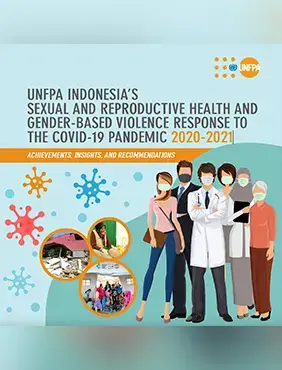In the early months of 2020, the world was starting to learn about the coronavirus disease (COVID-19), a newly discovered and highly contagious strain of the coronavirus. Its seemingly abrupt emergence as well as its staggering ability to spread, quickly upended the world’s collective sense of normalcy and pushed nations to implement significant changes to even the most mundane activities. In Indonesia, the first official case of COVID-19 was recorded on March 2, 2020. At present (July 2021), Indonesia is experiencing its most significant spike in confirmed cases to date, placing it as the “new epicenter of the pandemic.” In total, WHO has reported over 3 million COVID-19 cases and 80 thousand deaths in the country (per July 23, 2021).
In response to the vast reach and growing threat of COVID-19, UNFPA formulated a global response plan during the earlier months of the pandemic to address the disproportionate toll of COVID-19 on marginalized groups, particularly women and girls. At the country level, UNFPA Indonesia developed a Sexual and Reproductive Health (SRH) and Gender-based Violence (GBV) response in support of the Government of Indonesia (GoI) and its efforts to address the various impacts of the COVID-19 pandemic. UNFPA Indonesia’s SRH and GBV Response Plan was developed in line with the UNFPA Global Response Plan, and in support of the UN Indonesia Multi-Sector and Socio-Economic Response Plans and their priority areas.
UNFPA Indonesia’s SRH and GBV Response Plan received additional funding from the Australian Government Department of Foreign Affairs and Trade (DFAT Australia), Global Affairs Canada (GAC), and the United Nations Entity for Gender Equality and Empowerment (UN Women), which enabled the response to widen its reach and deepen its impact in COVID-19 affected areas. This response plan was implemented in partnership with government and professional agencies, civil society organizations, and academic institutions (listed in the table below). Furthermore, program implementation in the field was supported by local government agencies and organizations.
The achievements described in this report focus on the SRH and GBV initiatives that were conducted between June 2020 and June 2021. With full consideration of the on-going COVID-19 pandemic and the various limitations it presents, all activities under this response were formulated and adjusted to ensure the safe continuity of SRH services and the effective management/prevention of GBV in Indonesia. In this regard, UNFPA Indonesia, in collaboration with its implementing partners, has made significant strides towards these goals through the following activities:
- Distribution of personal protective equipment PPE, maternity kits, and dignity kits (to protect service providers and their patients/clients).
- Continuation of service provider training through online platforms (to improve service delivery).
- Dissemination of information through online platforms (to raise public knowledge and awareness).
- Community engagement in humanitarian settings (offline engagement following COVID-19 protocols).
- Documentation for future reference and sustainability.
Reflections from UNFPA’s implementing partners have been compiled, summarized, and categorized under the following thematic categories: 1) distribution of essential equipment in disaster and non-disaster areas; 2) making the shift from offline to online platforms; 3) ensuring clear lines of communication and strong coordination; and 4) encouraging innovation in service delivery. Similarly, the recommendations in this report correspond specifically to the implementation of SRH and GBV activities under the current COVID-19 pandemic. In doing so, these recommendations illustrate clear and practical considerations that can be used to improve the development of future programs in a pandemic situation.


